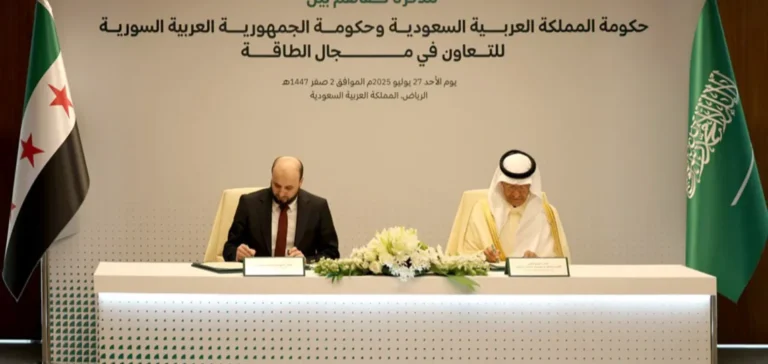Saudi Arabia and Syria have announced the signing of a memorandum of understanding to deepen their cooperation in the energy sector in Riyadh. Saudi Arabia’s Minister of Energy, Prince Abdulaziz bin Salman Al Saud, and Syria’s Minister of Energy, Mohammad Al-Bashir, discussed new perspectives to strengthen their bilateral relations in oil, electricity, renewable energy, energy efficiency and investment.
Acceleration of energy exchanges and interconnection
The memorandum of understanding specifies that both governments wish to collaborate in the development of joint projects related to oil, natural gas, and petrochemicals. The agreement also provides for the study of solutions for an electricity interconnection between the two countries, which could foster an increased flow of electricity within the region. The focus is also on cooperation in the field of renewable energies, a key sector for diversifying the energy mix.
Discussions covered the exchange of expertise in energy policies and regulations. This area aims to support Syria in the reconstruction and modernisation of its energy infrastructure, by integrating international technical standards and best sector practices.
Cross-investment and knowledge transfer
The text emphasises the intention of both parties to increase cross-investment by stimulating public and private partnerships in different segments of the energy sector. The ministers stressed that the cooperation will be structured around optimising energy efficiency and economic growth, with the launch of joint projects in the short and medium term.
The agreement also provides for the establishment of training programmes and knowledge transfer initiatives between actors in both countries. This approach aims to strengthen technical capacities and the management of Syrian energy projects, while opening new opportunities for companies specialising in the sector.
Regional momentum and market outlook
This energy rapprochement comes in a context of transformation of regional markets, marked by the emergence of new alliances and the desire to secure supply. According to the terms of the agreement, each project will be jointly monitored by both governments to ensure operational deployment.
A senior official involved in the signing of the memorandum stated that this agreement could generate “unprecedented opportunities for the modernisation of infrastructure and the development of energy networks in the region”.






















